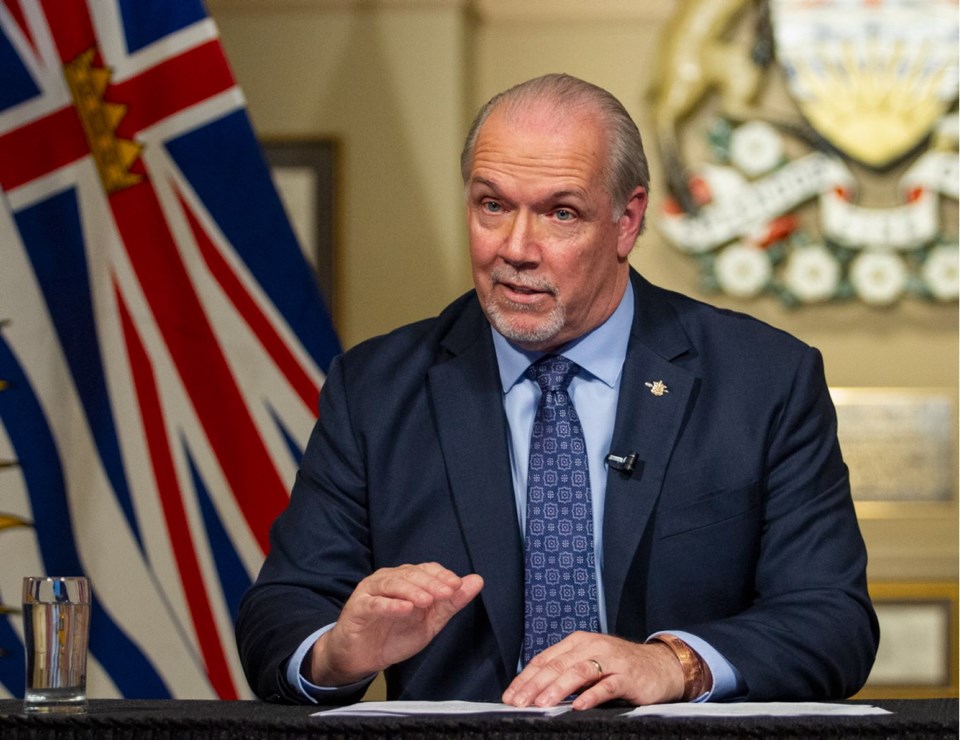A four-part “restart plan” will roll out over the next few weeks, easing pandemic restrictions on the economic, social, educational and recreational lives of British Columbians.
“It won’t be the flipping of a switch,” said Premier John Horgan. “We’re going to be proceeding carefully, bit by bit, one step at a time.”
The plan, which will kick in on May 19, allows for a gradual expansion of economic and social activity — including the full resumption of schools in September — while continuing to slow the growth of COVID-19 cases through social distancing and a continued ban on gatherings of more than 50 people.
“Every step will be informed by the advice of the provincial health officer as well as the input from British Columbians in every corner of this province,” said Horgan, who plans to recall the legislature in a few weeks.
“We need to ensure that people stay healthy and that British Columbians can move forward competently as we proceed to the other side of the new normal.”
Many sectors, including construction, manufacturing, agriculture and silviculture, have remained open during the pandemic.
Some sectors — dentistry, in-person counselling, personal care services, restaurants, museums, transit and child care — are expected to reopen in mid May, and most provincial parks will open May 15 in time for the Victoria Day long weekend.
A plan on which postponed surgeries and procedures will be rescheduled will be unveiled today. Health Minister Adrian Dix has signalled that the most serious cases will be rescheduled first.
All businesses and organizations must have a clear COVID-19 plan.
Anyone who is sick must stay home, Horgan said, adding that the province is working with the federal government to protect sick workers.
“After the Victoria Day long weekend, we expect we’ll see more businesses see their plans put in place,” he said.
“We’ll see more doors opening, restaurants will start to operate, pubs will start to open, you can get that haircut — provided that we have a good understanding of how we can operate these businesses with appropriate physical distancing and safety as the highest priority.”
Measures will include transparent-plastic barriers, increased sterilization methods, fewer people and greater physical distance between them in establishments.
If transmission rates remain low, other sectors could follow: Hotels and resorts could reopen in June, along with further park openings and some overnight camping. July could see movie theatres and symphony performances.
Schools are expected to see a full reopening in September. Some schools are already operating for the children of essential service workers and those who need in-classroom attention.
That will be expanded, “but [Education Minister Rob Fleming] and I will be having more to say about that probably later next week or perhaps after the long weekend,” Horgan said. “For those that are graduating in 2020 and will not be having a ceremony, I regret that very much.”
The final phase in the plan won’t be enacted until there’s a vaccine or treatment for COVID-19 or community immunity has been achieved, Horgan said. “Until these things happen, B.C. will not be hosting rock concerts and conventions, or any other large gatherings beyond 50 people.”
B.C. provincial health officer Dr. Bonnie Henry announced 23 new confirmed cases of COVID-19 on Wednesday, for a total of 2,255 cases. There were three new deaths attributed to the virus, for a total of 124 deaths in the province.
There have been 124 confirmed cases on Vancouver Island, with no additional cases announced Wednesday.
If British Columbians continue to hold the line on the pandemic, “in the next week and a half, by the long weekend, is the time that we will be able to go out and hug our families,” she said.
Henry will be promoting the idea of the “double bubble” — allowing people to expand their family, household or friend bubbles but continuing to limit contacts beyond that.
The measures in place have reduced people’s contacts to about 30 per cent of normal, Henry said. The goal is to increase contacts up to 60 per cent of normal — a move that is expected to increase the number of cases and hospitalizations but not beyond a “manageable” level.
Outside that expanded bubble, the message is to maintain physical distance, wear a non-medical mask, screen for symptoms daily, and work from home when possible.
“We are not prescribing to British Columbians who they interact with and how they interact with them, only to say that the best way to protect everyone is to observe social distancing, be sure you’re washing your hands regularly,” Horgan said.
“If we lose this discipline, everything we have worked for until this point will be lost,” he said. “We need to get it right, and we need to make sure that we progress together, slowly and safely.”
Henry has previously said that restrictions on visitors to seniors homes and hospitals will be eased. The premier did not address the issue on Wednesday. The Health Ministry is expected to direct health authorities on this but a timeline has not been made public.
Mid-May:
• Restoration of health services including elective surgeries, dentistry, physiotherapy, registered massage therapy, chiropractors, physical therapy and speech therapy.
• Retail sector.
• Hair salons, barbers and other personal service establishments.
• In-person counselling.
• Restaurants, cafés, pubs, as long as there is sufficient distancing.
• Museums, art galleries, libraries.
• Office-based worksites.
• Recreation and sports.
• Parks, beaches and outdoor spaces.
• Transit services.
• Child care.
June:
• Hotels and resorts.
• Some overnight camping in parks.
• Film industry, beginning with domestic productions, in June and July.
July:
• Movies and symphony, but not large concerts.
September:
• Post-secondary education, with a mix of online and in-class.
• Kindergarten to Grade 12.
To be determined:
• Night clubs, casinos and bars.
• Large gatherings; crowds of 50 or more are currently not allowed.
• Conventions.
• Professional sports and concerts with live audiences.
• International tourism.



